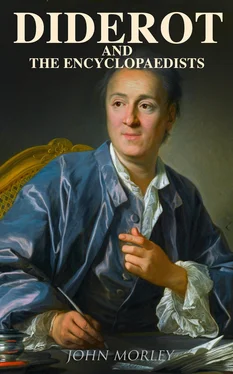1 ...8 9 10 12 13 14 ...30 In a short continuation of the Philosophical Thoughts entitled On the Sufficiency of Natural Religion, Diderot took the next step, and turned towards that faith which the votaries of each creed allow to be the best after their own. Even here he is still in the atmosphere of negation. He desires no more than to show that revealed religion confers no advantages which are not already secured by natural religion. "The revealed law contains no moral precept which I do not find recommended and practised under the law of nature; therefore it has taught us nothing new upon morality. The revealed law has brought us no new truth; for what is a truth but a proposition referring to an object, conceived in terms which present clear ideas to me, and the connection of which with one another is intelligible to me? Now revealed religion has introduced no such propositions to us. What it has added to the natural law consists of five or six propositions which are not a whit more intelligible to me than if they were expressed in ancient Carthaginian, inasmuch as the ideas represented by the terms, and the connection among these ideas, escape me entirely."[38]
There is no sign in this piece that Diderot had examined the positive grounds of natural religion, or that he was ready with any adequate answer to the argument which Butler had brought forward in the previous decade of the century. We do not see that he is aware as yet of there being as valid objections on his own sceptical principles to the alleged data of naturalistic deism, as to the pretensions of a supernatural religion. He was content with Shaftesbury's position.
Shaftesbury's influence on Diderot was permanent. It did not long remain so full and entire as it was now in the sphere of religious belief, but the traces of it never disappeared from his notions on morals and art. Shaftesbury's cheerfulness and geniality in philosophising were thoroughly sympathetic to Diderot. The optimistic harmony which the English philosopher, coming after Leibnitz, assumed as the starting-point of his ethical and religious ideas, was not only highly congenial to Diderot's sanguine temperament; it was a most attractive way of escape from the disorderly and confused theological wilderness of sin, asceticism, miracle, and the other monkeries. This naturalistic religion may seem a very unsafe and comfortless halting-place to us. But to men who heard of religion only in connection with the Bull Unigenitus and confessional certificates, with some act of intolerance or cruelty, with futile disputes about grace and the Five Propositions, the naturalism which Shaftesbury taught in prose and Pope versified was like the dawn after the foulness of night. Those who wished to soften the inhuman rigour of the criminal procedure of the time[39] used to appeal from customary ordinances and written laws to the law natural. The law natural was announced to have preceded any law of human devising. In the same way, those who wished to disperse the darkness of unintelligible dogmas and degraded ecclesiastical usages, appealed to the simplicity, light, and purity of that natural religion which was supposed to have been overlaid and depraved by the special superstitions of the different communities of the world.
"Pope's Essay on Man," wrote Voltaire after his return from England (1728), "seems to me the finest didactic poem, the most useful, the most sublime, that was ever written in any tongue. 'Tis true the whole substance of it is to be found in Shaftesbury's Characteristics, and I do not know why Pope gives all the honour of it to Bolingbroke, without saying a word of the celebrated Shaftesbury, the pupil of Locke."[40] The ground of this enthusiastic appreciation of the English naturalism was not merely that it made morality independent of religion, which Shaftesbury took great pains to do. It also identified religion with all that is beautiful and harmonious in the universal scheme. It surrounded the new faith with a pure and lofty poetry, that enabled it to confront the old on more than equal terms of dignity and elevation. Shaftesbury, and Diderot after him, ennobled human nature by placing the principle of virtue, the sense of goodness, within the breast of man. Diderot held to this idea throughout, as we shall see. That he did so explains a kind of phraseology about virtue and morality in his letters to Madame Voland and elsewhere, which would otherwise sound disagreeably like cant. Finally, Shaftesbury's peculiar attribution of beauty to morality, his reference of ethical matters to a kind of taste, the tolerably equal importance attributed by him to a sense of beauty and to the moral sense, all impressed Diderot with a mark that was not effaced. In the text of the Inquiry the author pronounces it a childish affectation in the eyes of any man who weighs things maturely to deny that there is in moral beings, just as in corporeal objects, a true and essential beauty, a real sublime. The eagerness with which Diderot seized on this idea from the first, is shown in the declamatory foot-note which he here appends to his original.[41] It was the source, by a process of inverted application, of that ethical colouring in his criticisms on art which made them so new and so interesting, because it carried æsthetic beyond technicalities, and associated it with the real impulses and circumstances of human life.[42]
One of Diderot's writings composed about our present date (1747), the Promenade du Sceptique, did not see the light until after his death. His daughter tells us that a police agent came one day to the house, and proceeded to search the author's room. He found a manuscript, said, "Good, that is what I am looking for," thrust it into his pocket, and went away. Diderot did his best to recover his piece, but never succeeded.[43] A copy of it came into the hands of Naigeon, and it seems to have been retained by Malesherbes, the director of the press, out of goodwill to the author. If it had been printed, it would certainly have cost him a sojourn in Vincennes.
We have at first some difficulty in realising how he police could know the contents of an obscure author's desk. For one thing we have to remember that Paris, though it had been enormously increased in the days of Law and the System (1719–20), was still of a comparatively manageable size. In 1720, though the population of the whole realm was only fourteen or fifteen millions, that of Paris had reached no less a figure than a million and a half. After the explosion of the System, its artificial expansion naturally came to an end. By the middle of the century the highest estimate of the population does not make it much more than eight hundred thousand.[44] This, unlike the socially unwholesome and monstrous agglomerations of Paris or London in our own time, was a population over which police supervision might be made tolerably effective. It was more like a very large provincial town. Again, the inhabitants were marked off into groups or worlds with a definiteness that is now no longer possible. One-fifth of the population, for instance, consisted of domestic servants.[45] There were between twenty-eight and thirty thousand professional beggars.[46] The legal circle was large, and was deeply engrossed by its own interests and troubles. The world of authorship, though extremely noisy and profoundly important, still made only a small group. One effect of a censorship is to produce much gossip and whispering about suspected productions before they see the light, and these whispers let the police into as many secrets as they choose to know.
In Diderot's case, his unsuspecting good-nature to all comers made his affairs accessible enough. His house was the resort of all the starving hacks in Paris, and he has left us more than one graphic picture of the literary drudge of that time. He writes, for instance, about a poor devil to whom he had given a manuscript to copy. "The time for which he had promised it to me expired, and as my man did not appear, I became uneasy, and started in search of him. I found him in a hole about as big as my fist, almost pitch-dark, without the smallest scrap of curtain or hanging to cover the nakedness of his walls, a couple of straw-bottomed chairs, a truckle-bed with a quilt riddled by the moths, a box in the corner of the chimney and rags of every sort stuck upon it, a small tin lamp to which a bottle served as support, and on a shelf some dozen first-rate books. I sat talking there for three-quarters of an hour. My man was as bare as a worm, lean, black, dry, but perfectly serene. He said nothing, but munched his crust of bread with good appetite, and bestowed a caress from time to time on his beloved, on the miserable bedstead that took up two-thirds of his room. If I had never learnt before that happiness resides in the soul, my Epictetus of Hyacinth Street would have taught it me right thoroughly."[47]
Читать дальше












